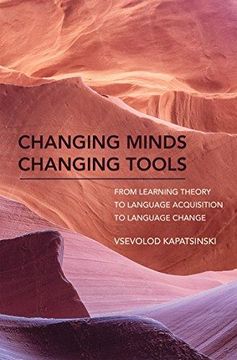Share
Changing Minds Changing Tools: From Learning Theory to Language Acquisition to Language Change (The mit Press)
Vsevolod (Associate Professor, University Of Oregon) Kapatsinski (Author)
·
The Mit Press
· Hardcover
Changing Minds Changing Tools: From Learning Theory to Language Acquisition to Language Change (The mit Press) - Vsevolod (Associate Professor, University Of Oregon) Kapatsinski
Choose the list to add your product or create one New List
✓ Product added successfully to the Wishlist.
Go to My Wishlists
Origin: U.S.A.
(Import costs included in the price)
It will be shipped from our warehouse between
Monday, June 17 and
Wednesday, July 03.
You will receive it anywhere in United Kingdom between 1 and 3 business days after shipment.
Synopsis "Changing Minds Changing Tools: From Learning Theory to Language Acquisition to Language Change (The mit Press)"
A book that uses domain-general learning theory to explain recurrent trajectories of language change.In this book, Vsevolod Kapatsinski argues that language acquisition―often approached as an isolated domain, subject to its own laws and mechanisms―is simply learning, subject to the same laws as learning in other domains and well described by associative models. Synthesizing research in domain-general learning theory as it relates to language acquisition, Kapatsinski argues that the way minds change as a result of experience can help explain how languages change over time and can predict the likely directions of language change―which in turn predicts what kinds of structures we find in the languages of the world. What we know about how we learn (the core question of learning theory) can help us understand why languages are the way they are (the core question of theoretical linguistics).Taking a dynamic, usage-based perspective, Kapatsinski focuses on diachronic universals, recurrent pathways of language change, rather than synchronic universals, properties that all languages share. Topics include associative approaches to learning and the neural implementation of the proposed mechanisms; selective attention; units of language; a comparison of associative and Bayesian approaches to learning; representation in the mind of visual and auditory experience; the production of new words and new forms of words; and automatization of repeated action sequences. This approach brings us closer to understanding why languages are the way they are, Kapatsinski contends, than approaches premised on innate knowledge of language universals and the language acquisition device.
- 0% (0)
- 0% (0)
- 0% (0)
- 0% (0)
- 0% (0)
All books in our catalog are Original.
The book is written in English.
The binding of this edition is Hardcover.
✓ Producto agregado correctamente al carro, Ir a Pagar.

